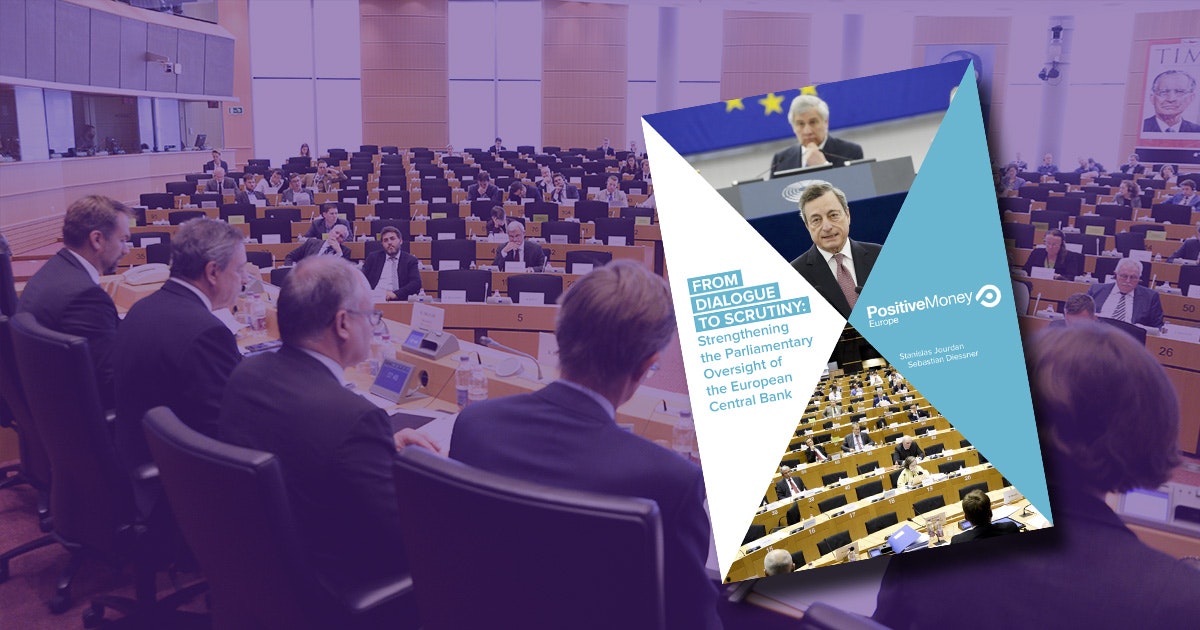REPORT: Strengthening the Parliamentary scrutiny of the European Central Bank

In our new report “From Dialogue to Scrutiny: Strengthening the Parliamentary oversight of the European Central Bank“, Sebastian Diessner and Stanislas Jourdan advocate for a stronger role of the European Parliament in holding the European Central Bank to account.
In the aftermath of the Eurozone crisis, it is clear that the European Central Bank (ECB) has extended its competences and area of influence. In comparison however, the accountability framework of the ECB was not leveled up – it remains largely weak and informal. Moreover, the fact that the ECB’s statutes are enshrined into the EU Treaties makes it extremely difficult to amend. This reinforces even further the independence of the Bank.
All in all, although the European Central Bank is legally accountable to the European Parliament, this accountability remains largely symbolic given that the Parliament is deprived from any sanctioning power vis à vis the ECB, in particular when it comes to its advisory role in appointments to the ECB board.
In practice, the European Parliament’s main way to exercise its accountability is the “monetary dialogue”: the quarterly hearing with the ECB President which is hosted by the Parliament’s Committee on Economic and Monetary Affairs (ECON). However according to our experience, which seems to be shared by a number of observers, it appears that MEPs could make a much better use of those exchanges of views. Indeed, the questions asked by MEPs tend to be very broad or redundant, making it difficult for the exchange to go the bottom of the (often very complex) topics. By adopting a more focused, coordinated and persistent approach in the exercise of its oversight, the ECON Committee has the potential to play a much more meaningful and visible role.
At the same time, it also appears that the European Parliament is deprived from key instruments which would allow it to play a more decisive and democratic role. In particular, it is odd that the Parliament does not have a veto power in the appointment process to the ECB’s Executive Board, even though everyone seems to agree that it would “look bad” if the Parliament’s opinion would be ignored. Hence, it would seem logical to tilt the balance of power towards the Parliament vis à vis the Eurogroup and the Council on that matter.
Now is the right time to reinforce the accountability framework of the ECB
Strong accountability of the European Central Bank is the ultimate line of defence for its independence. 20 years after the creation of the single currency, and in the face of all the uncertainties surrounding the health of the Eurozone economy, and the growing criticism against central banks at large, now is the right time to reinforce the accountability framework of the European Central Bank. While a number of measures (including Treaty change and amending the ECB statutes) might be ultimately required on the medium or long term, we advocate that the first priority should be to strengthen the role of he European Parliament, moving beyond the current approach of “dialogue” towards a proper parliamentary scrutiny. Such step would contribute to anchoring the debate on the future of the European Central Bank within institutional processes.
In our new report released today, we make the following recommendations:
Creating a subcommittee of ECON dedicated to the oversight of the ECB, in order to enhance the specialization, focus and persistence of parliamentary scrutiny;
Revising the “monetary dialogue” quarterly hearings with the ECB President, by increasing preparation for the hearings, giving more flexible allocation of speaking time to allow MEPs to explore complex monetary policy issues in more depth;
Granting more power to the European Parliament in the appointment process of future executive board members to the European Central Bank, including the provision of a balanced shortlist of candidates by the Council.
Formalize the current accountability framework in an inter-institutional agreement, to be ci-signed by the ECB, the EP and the Council.